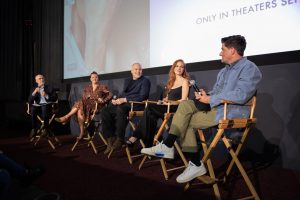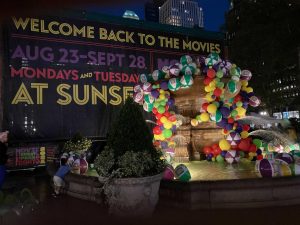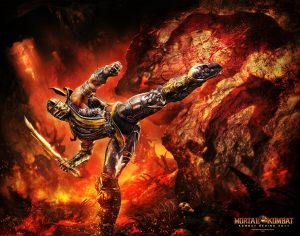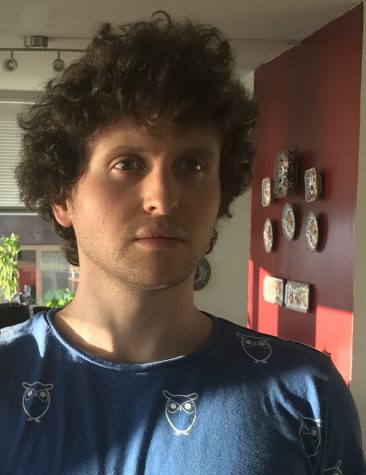Writer of ‘Jurassic Park’ and ‘Spiderman’ Explains Happiness Is Becoming Who You Were
David Koepp, a Hollywood screenwriter and now father of four, has made his mark on Hollywood with vastly different adaptations and originals
COURTESY OF MELISSA THOMAS
The screenwriter behind “Jurassic Park” and “Toy Soldiers” believes writing has made him into who he is today.
September 29, 2021
“There’s a funny thing I’ve noticed about growing up. You sorta end up who you were. My problem is I don’t remember much about who I was,” Peter Parker narrates in the unproduced sequel to “Spiderman” by screenwriter David Koepp.
The lines are powerful in their simplicity. They resonate. It’s the type of writing Koepp regularly produces for Hollywood: character-driven, authentic and believably human. Koepp’s compelling writing makes him one of the most successful screenwriters of all time, firmly embedding him on Hollywood’s writer A-list.
Looking at Koepp’s films, one is not struck with obvious similarities. “Carlito’s Way,” “Jurassic Park” and “Spiderman” are vastly different viewing experiences. The huge variety makes Koepp’s writing hard to recognize. If there is a thread of consistency, it’s that directors and producers trust him to adapt written work for the screen. Koepp has mastered the art of translating complex and lengthy narratives for cinema, cherry-picking some moments and discarding others to distill the essence of the story.
“There’s no commonality in my work overall because I try consciously to mix it up and do different things to challenge myself,” Koepp said.
Unlike his adaptations, his original works have a more recognizable aesthetic, yet they remain largely unknown because so many of them are unpublished.
“Hollywood’s always happy to give you opportunities that are similar to something you’ve done in the past,” he remarked. Although his first three films were originals, Koepp had only recently transitioned to film adaptations with “Toy Soldiers” when he was tasked with adapting “Carlito’s Way,” three separate books with around 800 pages of material. It was, he explained, “a gigantic job.”
“As a writer you make your own opportunities. I loved that.”David Koepp
“After I had done a successful adaptation of ‘Carlito’s Way,’ I was offered ‘Jurassic Park’ … I had a couple successes early, so Hollywood said, ‘Hey, he can do this.’”
The prevailing attitude in Hollywood, Koepp explained, is the simple need for writers who can tell a story with pictures and dialogue. It may be a difficult requirement, but it’s not a particularly complex one.
The basic task of storytelling through images and dialogue is “all they really care about” in Hollywood, Koepp said, adding one caveat: “The job of a screenwriter is also to attract others to the script — to write a screenplay that a director wants to direct, to write parts that actors want to play.” It’s an exercise in storytelling, but also in magnetism. Koepp understands the roles actors want to play largely because he almost was one himself.
When Koepp’s playwriting professor noticed the plays he wrote resembled movies, he suggested film school.
Before he found success as a writer, Koepp began college as a theatre major with aspirations to act. “Midway through, I realized that as much as I enjoyed acting, I was enjoying writing more.” It was writing, Koepp said, which “afforded greater freedoms.”
“As an actor, if someone doesn’t give you the part, that’s the end of the story. But as a writer you make your own opportunities. I loved that,” he said.
When Koepp’s playwriting professor noticed the plays he wrote resembled movies, he suggested film school. There, Koepp solidified his wheelhouse in writing. Despite his ability, he would discover that screenwriters aren’t the most beloved figures in Hollywood.
Koepp explained that many feel they should be able to write screenplays, but just can’t.
When he accepted the Ian McLellan Hunter Award in 2013, Koepp said that “people who hire writers don’t hate them for being unreasonable, but rather because they are the only ones in the industry who can do their job without permission. Unlike a director, an actor, or a producer, no one needs to say ‘yes’ before you write.”
Recalling that speech of eight years ago, Koepp explained that many feel they should be able to write screenplays, but just can’t. Writing isn’t just throwing words on a page; it’s not just about knowing the alphabet.
“Our job is to create a world the way we think it ought to be. And nobody ever pulled that off by being reasonable.”
“Miss the moon entirely, sure, but maybe discover a whole new planet.”David Koepp
The father of four has also drawn inspiration from watching his children grow up.
“You can kind of see who they are right away. And then they get older and go through phases and changes and trying on different identities,” he explained. “But happiness hopefully comes from settling back into who you are.”
I asked if he personally felt that growing up has made him into who he was.
“Oh, certainly!” Koepp replied. “Human lives are like moon shots — you change it by a few degrees at liftoff, or really at any point along the trajectory, and you can rocket off into a completely different part of outer space. Miss the moon entirely, sure, but maybe discover a whole new planet.”
Koepp has just finished his second novel, a thriller called “Aurora,” out in June of 2022 from HarperCollins. When asked about leaving screenplays behind for novels, the answer was immediate and resounding. “Not ever…I love writing movies and I always will.”
Koepp’s next film, “KIMI,” was developed from an original script. It’s directed by Steven Soderbergh and will be premiering on HBO Max in February of 2022.
















